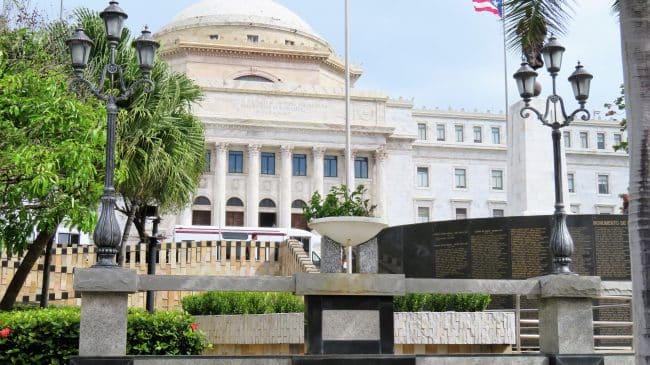Puerto Rico’s economy is suffering from a variety of ailments, including the consequences of its government’s poor long-term fiscal habits. The commonwealth is $129 billion in debt, its unemployment rate is about twice the U.S. average, and its poverty rate is more than double that of Mississippi, a state with one of the highest poverty rates in the United States.
Congress is considering legislation that was written specifically to address Puerto Rico’s debt crisis. If the bill passed, which is currently looking unlikely, the amendment would go far beyond Puerto Rico and potentially make a major impact on U.S. local governments’ ability to borrow money and on their practices of paying back debt.
In 2016, Puerto Rico had to, but couldn’t, pay $2 billion in bond obligations. The federal government interfered and established a new law: the Puerto Rico Oversight, Management, and Economic Stability Act (PROMESA). The law was created to provide financial oversight for dealing with what was about to become the largest default case in the history of the American public bond market.
Chapter 9 of the U.S. Bankruptcy Code excludes Puerto Rico, as an unincorporated territory, from declaring bankruptcy outright and restructuring its debt. PROMESA was meant to offer Puerto Rico a similar process to Chapter 9, giving the commonwealth an opportunity to manage its debt.
Now, the bill introduced by Rep. Raúl Grijalva (D-AZ) proposes drastic changes to PROMESA. The plan could open up the possibility of Puerto Rico voting away the $56 billion it owes to bondholders, which represents 43 percent of its $129 billion total debt. If Puerto Rico were allowed to do this, it would risk undermining the municipal bond market’s view that these special-revenue bonds are a reliable, low-risk investment. Since municipalities across the U.S. frequently rely on special-revenue bonds when raising funds for infrastructure projects, the bill could have far-reaching impacts across the country.
Historically, these types of government bonds have been viewed as a safe investment. They are backed by taxes or fees from essential services such as highways, public schools, and airports, reducing their potential for default. In addition, these bonds generate relatively high yields and are exempt from local, state and federal taxes.
The biggest long-term concern is that if Puerto Rico is allowed to disregard most or all of these obligations, it would send shock waves throughout the municipal market, limiting the access of other local governments to utilize this type of credit in the future.
In addition to bondholders, there are also other parties expecting payment from Puerto Rico. Around $55 billion of Puerto Rico’s debt is comprised of pension obligations, which are owed to public sector workers who have been promised retirement benefits.
The latest draft of PROMESA offers an in-between solution. Pensions would be cut on a sliding scale, with the biggest cut being up to 8.5 percent on the largest pensions and while the smallest pensions would be left intact. Meanwhile, bondholders would see an average reduction of 45 percent, with some receiving 64 cents per dollar owed to them while others would not be paid back at all.
Under Grijalva’s amendment, the Puerto Rican government would determine essential services that should be paid for and then would bondholders receive their payments — if there’s anything left. Thus, there’s a chance that bondholders wouldn’t get paid at all. Additionally, the bill’s revisions would also mean there’s little-to-no federal oversight of the process, dismantling the oversight and management portions right there in PROMESA’s (Puerto Rico Oversight, Management, and Economic Stability Act) name.
Pensions certainly shouldn’t be dismissed entirely, as they were promised to Puerto Rican workers who are depending on them. But bondholders also shouldn’t be left in the lurch because of the Puerto Rican government’s years of fiscal mismanagement.
When it comes to bond markets, a solution aimed at easing Puerto Rico’s problems could create widespread financial issues for local governments.
So while the original Puerto Rico Oversight, Management, and Economic Stability Act is flawed and far from a perfect solution, it provides better options than the current proposals. Congress should not throw the entire municipal bond market into flux in and, for now, should continue to let PROMESA work as written.

